
Jun 3, 2025
When Enoch Gyaesayor logs into a digital app each day to begin picking up passengers and drive around Accra, Ghana, he hopes to get a few hour-long trips where he can be paid the daily top amount from Mondays to Fridays. After paying the company’s commission and job-related expenses, he says he makes 150 cedis ($14.64).

Enoch Gyaesayor, an app-based driver in Ghana, connected platform workers together in a union to build strength to improve working conditions.
But most of the time, Gyaesayor and thousands of other digital app drivers and riders are paid even less, and often work up to 16 hours a day, even sleeping in their vehicles to save petrol money going home and to be ready to start working again as quickly as possible. Higher pay on weekends does not reduce the amount of time they must work.
“There is no ‘off’ day for the driver,” Gyaesayor says, noting that he works seven days a week to support himself and his family.
In Ghana and in countries around the world, the Solidarity Center is building strength with platform workers to create a broad-based, global movement in which app-based workers join together to assert their rights, protect their lives and improve working conditions. Unions and worker organizations are making democracy real in workplaces, legislatures and global forums.
Digital Platform Work: A Growing Industry that Undercuts Labor Rights
A rapidly exploding industry, digital platform work now employs between 154 million and 435 million workers in online jobs. While often seen as a flexible job arrangement, digital app-based work is a growing business model that systematically undercuts labor rights and protections and shifts the responsibility of costs to workers.
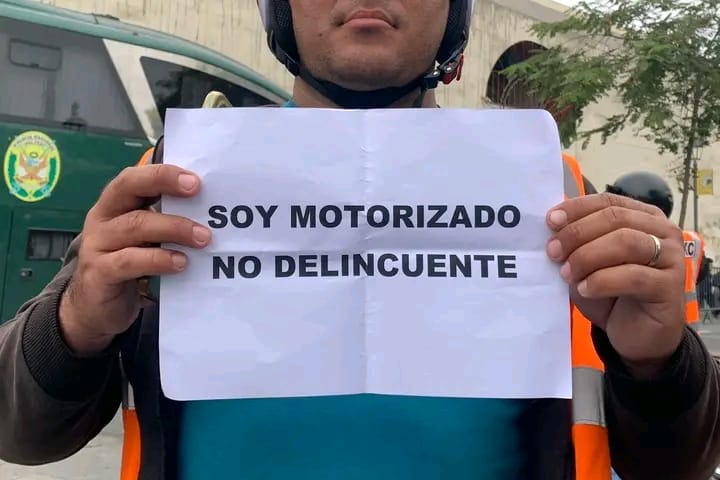
With support by the Solidarity Center and the CGTP, digital platform drivers formed a union to collectively push for decent work and are now at the ILO in Geneva urging passage of a treaty improving work for platform workers worldwide.
Around the world, consumers depend on digital platform workers—requesting rides from Uber or Bolt, ordering meals from Zomato, receiving groceries delivered from Glovo, or viewing content on a social media platform. The online platform acts as an intermediary between the worker and the employer. For most workers, these jobs are not a “side gig”–they are full-time work.
Yet app-based workers in Ghana and in most countries worldwide are defined as “independent contractors,” and so not covered by national labor laws, such as a country’s minimum wage.
Some 3 billion consumers used online food delivery service—groceries and meals—in 2024. Although global food delivery alone was an estimated $380.43 billion in 2024, the workers transporting the food, driving passengers and moderating online content receive little pay and no safe and healthy working conditions.
Joining Together to Improve Job Conditions
Gyaesayor and other platform workers in Ghana say their top concern is to decrease the percentage of the commission app-based companies require drivers to pay. Uber takes 35 percent from workers’ pay; Bolt, 27.5 percent and Yango up to 25 percent.
The commission fee is only a portion of what workers must pay. With available cars scarce in Ghana, some companies “rent” cars to drivers, adding to a worker’s expense, which also includes mobile phone data, petrol and repairs.
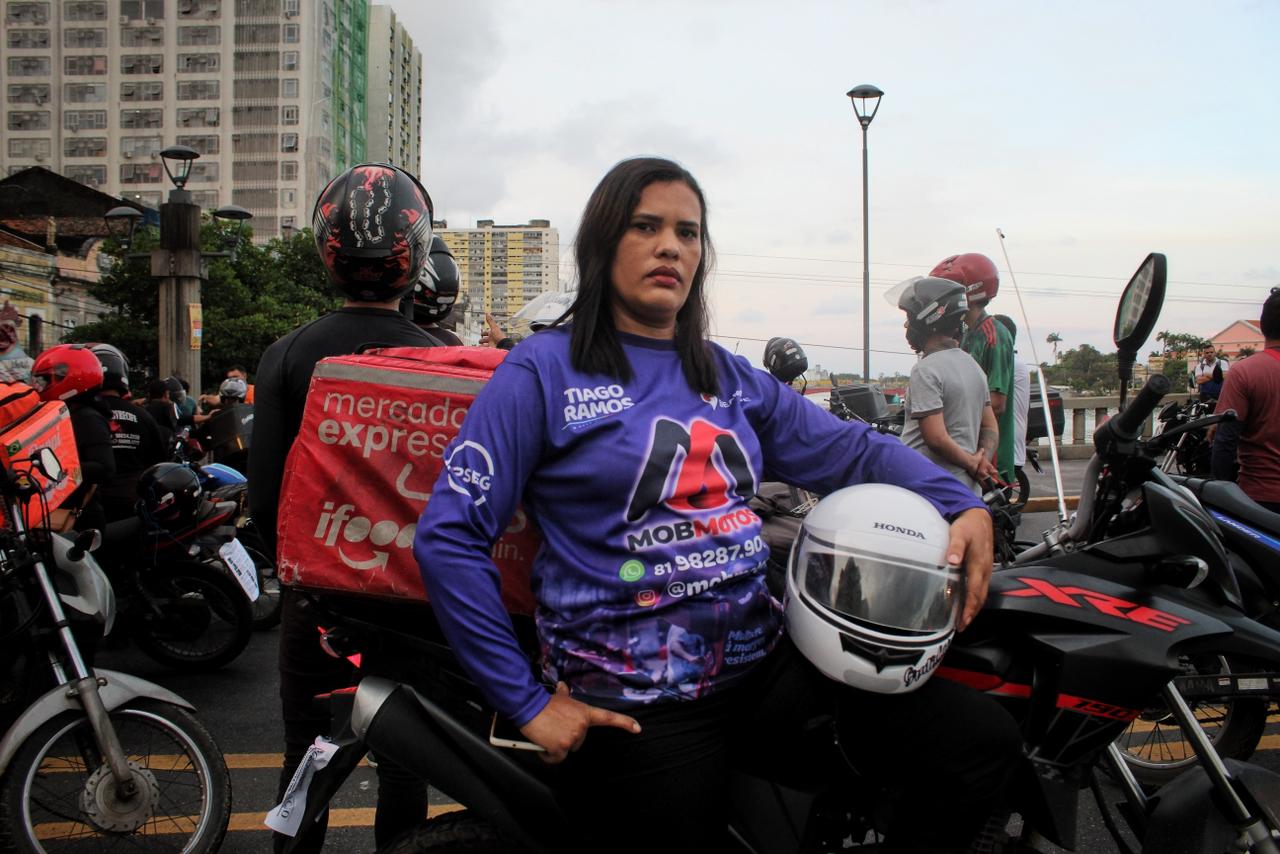
Delivery drivers say they suffer from exhausting workdays, low pay and poor health conditions. Credit: Paloma Luna
Algorithms, which often incorrectly determine distance, time and types of trips offered, further decrease pay. Workers operate at the will of the algorithm and have little recourse to find out why they are locked out of jobs or why kilometers are incorrectly calculated.
“There is a lot of uncertainty and lack of consistency when it comes to rides, how much you will get paid, and so on,” he says.
Gyaesayor, now general secretary of the Digital Transport Workers Union (DTWU), began joining together digital app workers by talking with platform drivers at car parks and shopping malls, urging them to come together to improve their conditions. Several associations representing couriers and other digital workers formed a small association in the Accra and Ashanti regions, By 2023, they created DTWU with a broader reach, joining the Ghana Trades Union Congress (GTUC).
Improve Working Conditions by Joining Together
The digital app union in Ghana, which includes car and bicycle drivers and couriers, is among dozens of platform worker unions around the world, with workers joining together to achieve key goals, including:
- Minimum wage standards.
- Safe working environments.
- Basic social protections such as annual leave, sick leave and retirement benefits.
- Labor law coverage in their countries grants them the same rights as all workers.
To gain these basic rights, workers are engaging in legal action to win unpaid wages, receive compensation for job-related injuries and establish safe working conditions. And, they are mobilizing to improve national and local laws.
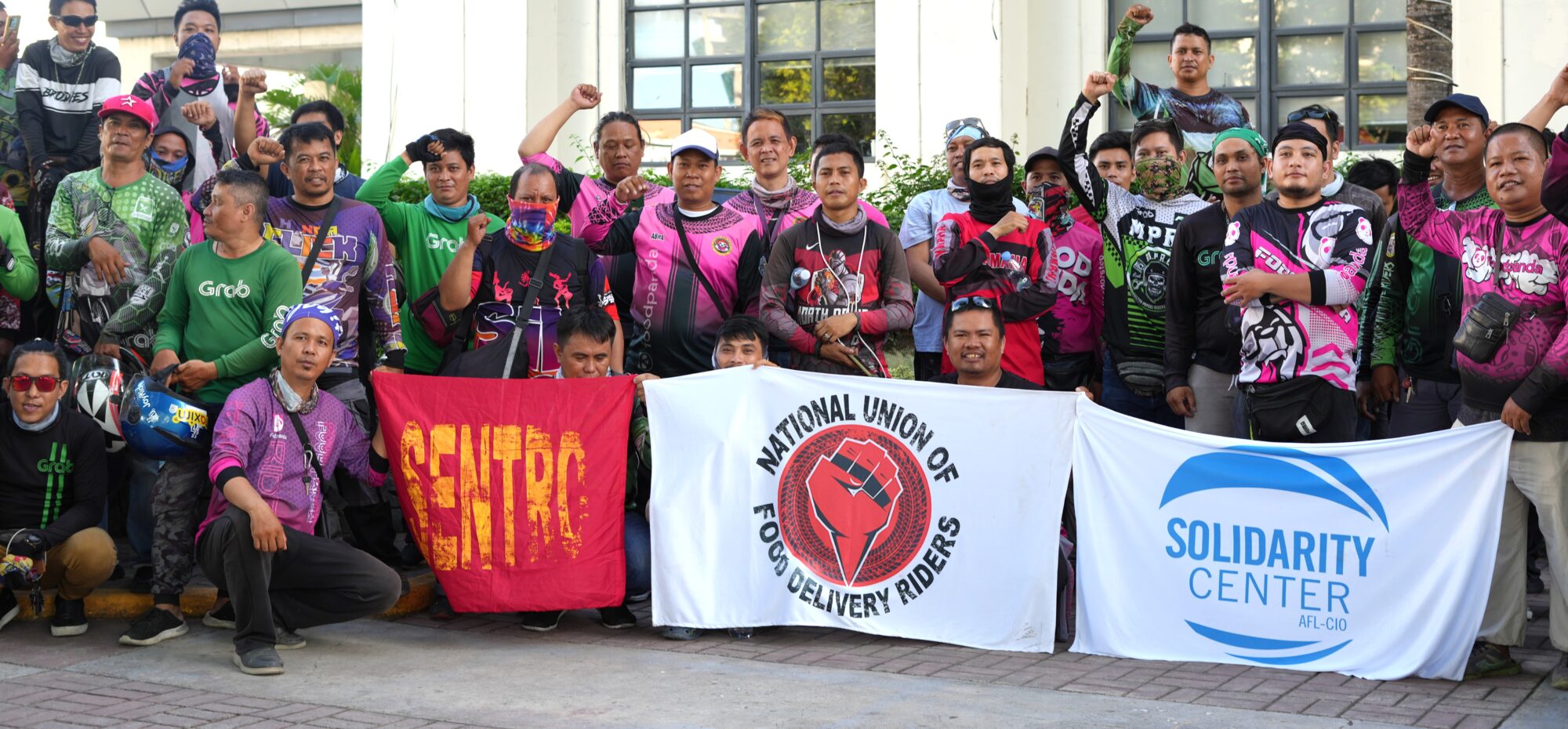
Food delivery riders improved pay at FoodPanda in Cebu, Philippines, part of platform workers’ efforts to assert their rights, protect their lives and improve working conditions.
across the globe.
Earlier this year in Mexico, app-based workers campaigned for — and won! — legislative reform that recognizes them as workers and provides access to accident insurance, pensions, maternity leave and company profits. In the Philippines, food delivery riders are improving benefits around the islands. In Cebu, Foodpanda drivers will receive a base fare of 55 pesos (94 cents) and the company will recognize them as employees.
Now, the workers are joining together to take their demands internationally.
Platform Workers Take Global Action
This week, platform work will be formally addressed for the first time on a global stage. At an International Labor Organization (ILO) conference in Geneva, digital app workers and representatives from business and governments are shaping a new international treaty, Realizing Decent Worker in the Platform Economy.
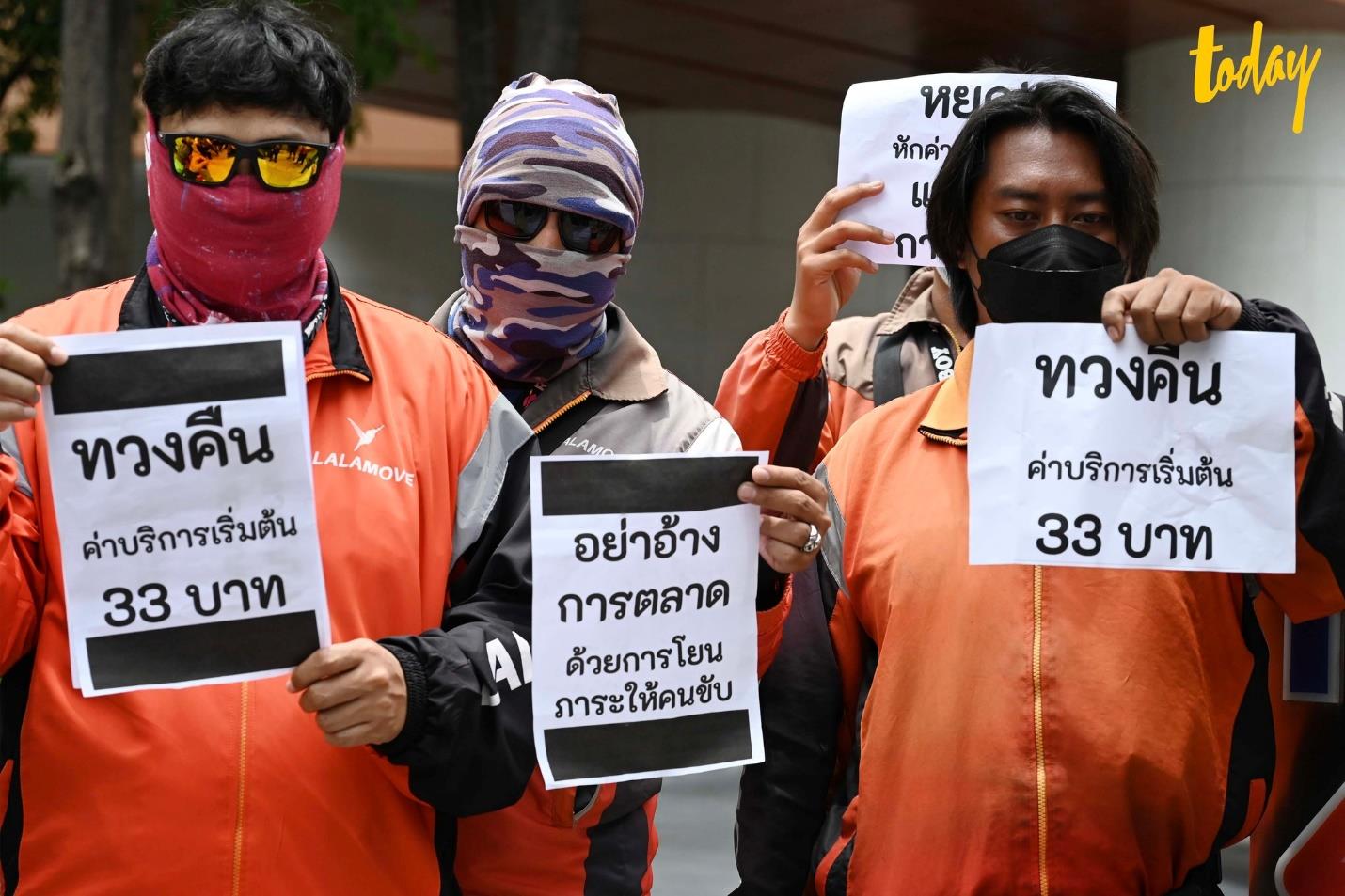
At an ILO conference in Geneva, digital app workers and representatives from business and governments are shaping a new international treaty to ensure decent work for platform workers around the globe.
Digital app workers have been crafting content that delegates will consider, and joining meetings with the International Trade Union Confederation (ITUC) and taking part in a six-day regional workshop in Togo by the ITUC-Africa. Platform workers also are involved in legislative strategies, meeting with their government representatives in advance of the conference.
Charith Attanapola, an app driver in Sri Lanka, met with the country’s minister of labor to convey platform workers’ challenges and discuss ways the government can improve working conditions.
“One of the key takeaways from our discussion was the government’s openness to ensuring decent work across all labor sectors, including app-based transport workers and delivery personnel,” says Attanapola.
Attanapola is part of the Solidarity Center delegation, which includes workers from Brazil, Chile, Ghana, India, Kenya and Mexico. As these workers testify, negotiate and help shape international labor standards that reflect the reality of their work and their demands, they understand the urgency in ensuring how jobs are shaped will determine the future.
In Ghana, where youth unemployment improved from 16.3 percent in 2000 to 5.4 percent in 2024, Gyaesayor knows that gain can be sustained only if decent work is available.
“Platform work has given employment to the majority of the youth; yet those of us who are working are being used like slaves, we get paid barely any salary,” says Gyaesayor. “The government must listen to the union, or things will get much worse; a lot of youth are going to be unemployed.”
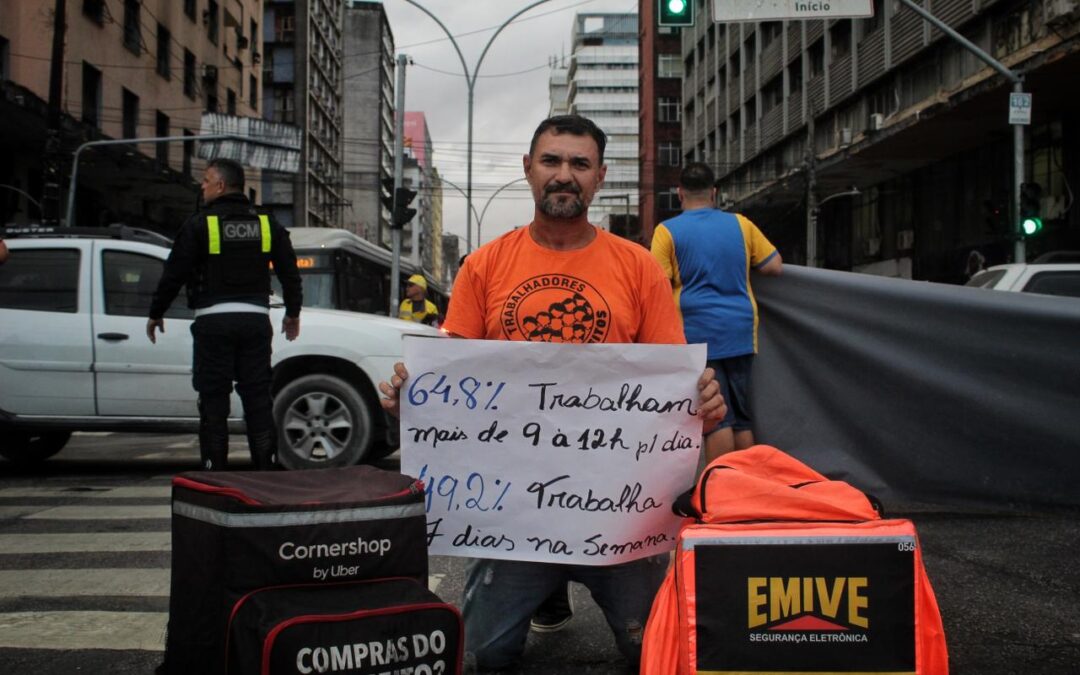
Sep 4, 2024
Delivery drivers at iFood in Brazil say they face exhausting workdays, low pay, lack of adequate company support and poor health conditions. In fact, wages that do not cover the cost of living -–or even do not meet the local minimum wage law—force drivers to work longer hours, leading to unsafe or hazardous working conditions and accidents, say experts and app-based drivers.
“There are dangerous conditions on the road with intense traffic that increases the risk of accidents,” says Beethoven Gomes de Oliveira, an app driver in João Pessoa. “This is also true for mototaxi workers. And the app companies don’t care about us workers, they treat us as if we are disposable.”

Delivery drivers say they suffer from exhausting workdays, low pay and poor health conditions. Credit: Paloma Luna
Injuries for the low-wage delivery drivers are on the rise. São Paulo Hospital reports that the percentage of trauma patients rose from 20 percent of motorcycle drivers in 2016 to 80 percent in 2022. Nearly seven people die riding a motorbike on average every day in São Paulo, which health and safety experts attribute to the rapid expansion of food delivery apps.
Workers Fear Poor Treatment Could Expand
Motorcycle and bike drivers are among Brazil’s 1.6 million app drivers and delivery people, a figure that grew rapidly after COVID as workers seek jobs in the informal economy to sustain themselves and their families. And iFood drivers delivered more than 100 million orders in August.
iFood is owned by the Dutch investment company Prosus, a subsidiary of South African tech giant Naspers, and dominates the Brazilian food delivery market with an approximately 80 percent share. iFood anticipates total revenue from its financial arm to rise 52 percent next year-–an amount workers say could easily cover living wages and safer working conditions.
“Pay is very low, not enough to meet our basic needs. For example, maintenance costs are very high, alongside vehicle insurance and food,” says Gomes de Oliveira, leader of the João Pessoa Municipal Delivery Workers’ Commission. We are out on the street all day–12 to 15 hours–to make 100 reales (approximately $18), and even that is a struggle.”
Fabricio Bloisi, iFood CEO, was appointed Naspers joint CEO in July, a move that app-based workers say may spread a business model that destroys their lives.
During a recent shareholders’ meeting, the Shareholder Association for Research and Education (SHARE) raised concerns about the treatment of delivery workers under Bloisi during his iFood tenure. The wider Naspers group owns the food delivery services Mr D Food, Superbalist, Takealot and Delivery Hero (25 percent).
iFood Stalls Negotiations, Basic Democratic Rights
App-based workers, the government and iFood worked together in 2023 on legislation to regulate the digital platform sector—but iFood did not negotiate in good faith with workers during the four-month process, stalling negotiations until recently when the company reached out to the Ministry of Labor.
Even as workers struggled for decent wages and safer working conditions, they say iFood has opposed their democratic right to form a union and stand together in their struggle. A FairWork report finds no evidence the platform ensures freedom of association and the expression of workers’ voice, and no evidence that it supports democratic governance.
Union supporters say they also are targeted by the company’s algorithm, with iFood blocking the accounts of leaders who question their organizing. Delivery drivers have regularly face inaccurate algorithims that cut their pay—or even deny them jobs.
“There are many algorithmic issues: accounts being blocked or deactivated, payments charged incorrectly or to the wrong person, deviations from the route without pay,” says Gomes de Oliveira.
A key part of drivers’ campaign for fairness is addressing arbitrary and unfair algorithms. Delivery workers suffer from bans from the app, without the right to defend themselves.
Company Should ‘Go Beyond Pursuit of Profits’
A 2022 report shows how far iFood was willing to control workers, including monitoring WhatsApp groups, creating fake profiles on social media and infiltrating with an agent. “The Hidden Propaganda Machine of iFood,” found the company hired an auditor specializing in human rights and spent over $1.1 million on research to determine strategies that would not increase the app’s fees during strikes.
As a result of the report and investigations conducted by the Federal Public Ministry and the Labor Public Ministry, iFood and its advertising agencies signed a Conduct Adjustment Term in July 2023. The company agreed it would not increase the fare for trips during a strike—an action delivery workers say often happened, resulting in “strikebreakers.” iFood also is obliged not to intervene directly or indirectly in workers’ organizations, and cannot influence the creation, operation and agendas of associations and unions.
Yet drivers say that iFood continues to violate international treaties, including the right for everyone, without discrimination, to equal pay for equal work and to form and join unions for the protection of their interests.
As the National App Delivery Workers’ Alliance said: “We believe that business leadership should go beyond the pursuit of profits. It should include a commitment to the well-being of workers, ensuring dignified working conditions and promoting practices that respect human rights.
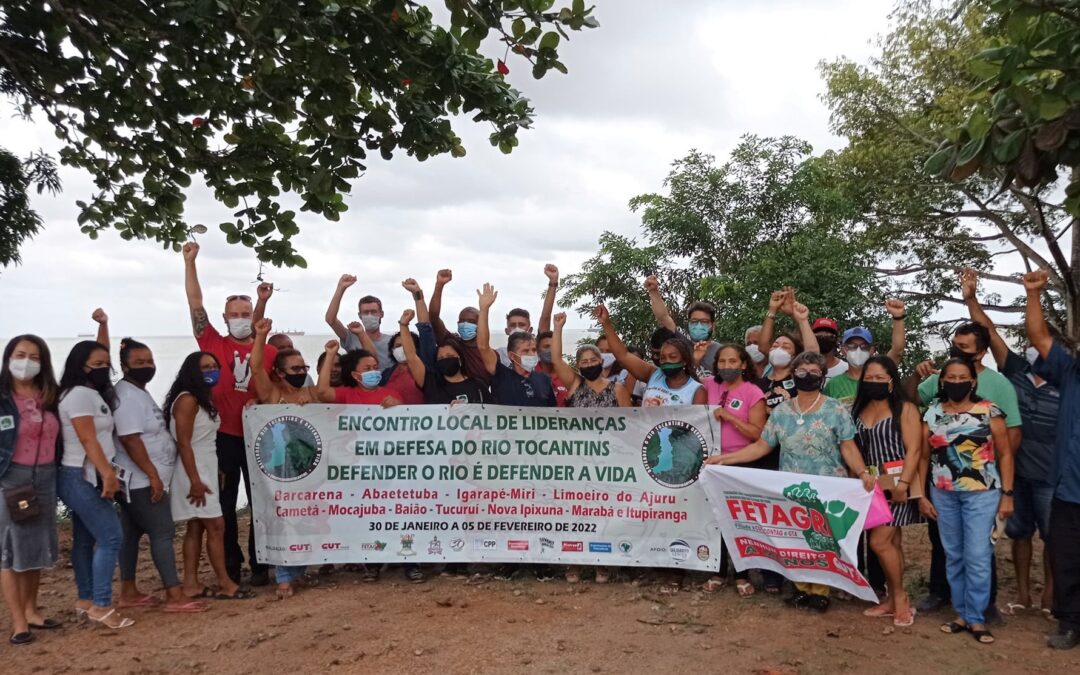
Mar 23, 2023
Brazilian communities along a river near the Amazon are celebrating the government’s decision to halt a blasting and dredging project that could destroy their livelihoods and severely damage the environment. Earlier this month, the Public Prosecutor’s Office recommended that the Brazilian Institute of the Environment and Renewable Natural Resources (IBAMA) suspend its preliminary license for the Araguaia-Tocantins waterway project in the state of Pará.
In suspending the license, the government cited the absence of prior consultation with residents who would be impacted, especially Indigenous communities and quilombolas, and the lack of information on the effects of the project on the communities.
The victory “has impacts not just for the local community, but also for the state and even further,” says Carmen Foro, speaking through an interpreter. Foro, a rural activist from the area, is former secretary-general of the Unity Worker Center in Brazil (CUT). “I feel that I and other community members are being heard, that we have opened a dialogue that this project can’t happen without our participation.” (Foro described her community’s fight for survival in a Solidarity Center Podcast episode last year.)
The project would have involved heavy dredging of the Tocantins River and require removing miles of the rocky Pedral do Lourenço river bed to increase navigability during the dry season and facilitate commodity export. IBAMA approved the preliminary license to begin the project in October 2022, ignoring several government agency recommendations.
Key to Success: Mobilizing a Diverse Coalition
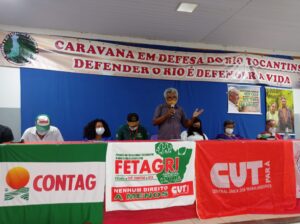
Members of the Caravan in Defense of the River Tocantins meet with residents of Nova Ipixuna to discuss a proposed waterway project that threatened livelihoods and the environment. Credit: Amazon Community
“This time in world history, it is really important to connect to the diversity around us,” Foro said. The campaign was victorious because “we created a grand alliance between the unions and with other movements, like quilombos, the Catholic Church, young people, women, fishers. And that alliance is what gave us strength.
“It was a collective struggle.”
These diverse groups, with support from the Solidarity Center, formed the Caravan in Defense of the Tocantins River to raise awareness about the negative impacts of the waterway construction and demand that the government honor international treaties respecting Indigenous and Tribal People’s right to safeguard and manage the natural resources on their lands. They reached thousands of people, through riverside meetings and in online forums.
With its strength in workers’ collective voice, the Brazilian labor movement was well-positioned to respond to the needs of workers and their communities, including the impact of climate change and environmental degradation on jobs and communities. “The unions in those cities are kind of seen as the principal organization in the social movements,” she said. “Along with the CUT, they were able to be an umbrella organization and give us support.”
The Struggle for Democracy Cannot Rest
Foro, who recently was selected by the new administration of President Luiz Inácio “Lula” da Silva to serve in the Ministry of Women, says “many women will be impacted by this project, and through my role now at the Ministry of Women, I plan to be alongside the women who are going to be impacted by this project.”
The license suspension is a huge victory, but the process is not over. “Everyone knows that this recommendation doesn’t resolve the issue,” she says. “The problem is still there and it will be a long journey. There still will be something in the middle between this recommendation.”
While she is hopeful about working with the new administration, whose election with the support of union and community groups opened dialogue with historically marginalized communities along the Amazon, Foro is keenly aware they must work to ensure the democratic process thrives.
“It’s important that we continue the fight, continue the struggle. Even with a democratically elected government that is representative now, there is still pressure that is coming from all different sides. The workers are part of that, but also there is the pressure from large companies, and agro-business as well. We have to continue to fight.”










